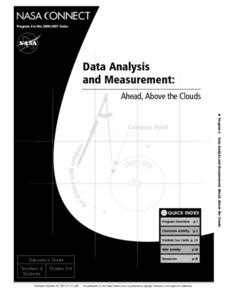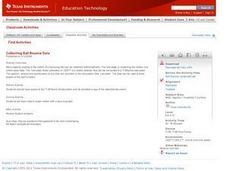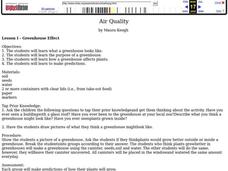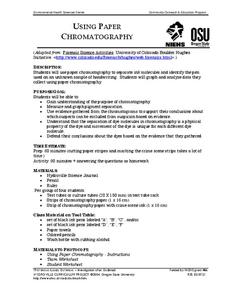Curated OER
Strike a Pose: Modeling in the Real World (There's Nothing to It!)
Adjust this lesson to fit either beginning or more advanced learners. Build a scatter plot, determine appropriate model (linear, quadratic, exponential), and then extend to evaluate the model with residuals. This problem uses real-world...
Curated OER
Energy Analysis
Students analyze information in graphs about U.S. energy consumption. For this energy consumption lesson, students create graphs and answer questions about U.S. energy consumption data. They determine trends in their graphs and research...
Curated OER
Activity One Teacher Page: Vehicles In Motion
Students identify variables that affect the system, and specify which variables are independent and which are dependent.
Curated OER
Data Analysis and Measurement: Ahead, Above the Clouds
Students explore and discuss hurricanes, and examine how meteorologists, weather officers, and NASA researchers use measurement and data analysis to predict severe weather. They plot points on coordinate map, classify hurricanes...
Curated OER
Comparing Linear and Exponential Data
Learners graph linear and exponential equations. In this algebra instructional activity, students differentiate between linear and exponential equations. They relate it to the real world.
Curated OER
Collecting Ball Bounce Data
Learners investigate quadratic equations as they use a CBR to collect and analyze data regarding a bouncing ball. Pupils explore different methods for determining the equation of the parabolic path including quadratic regression and...
Curated OER
First Class First? Using Data to Explore the Tragedy of the Titanic
Students analyze and interpret data related to the crew and passengers of the Titanic. They research information on a Titanic database to illustrate specific statistical conclusions, and whether or not social status affected the outcome.
Curated OER
Conflict Resolution in the World Today: Introduction to Current World conflicts, their Antecendents, the Progression, and their Potential Conclusions
Young scholars write a paragraph describing a conflict they had with a friend or a family member and a paragraph explaining how it was resolved. In this social science instructional activity, students share their paragraphs with a...
Curated OER
Comparing Temperatures and Latitudes
Eighth graders collect weather data from a variety of cities at the same latitudes, but on different continents. They organize data using spreadsheet program, generate graphs, and incorporate into a word processing document. Students...
Curated OER
Air Quality
Young scholars participate in many activities examining air quality. They examine the purpose of a greenhouse and make predictions. They also collect data and make graphs and charts.
Curated OER
Exploring Circles
Students explore circles using a graphing calculator. For this circles lesson, students write the equation of a circle with a given center and radius length. Students find the most appropriate model for each combination of data they...
Curated OER
Bounce Back - The Long and Short of It
Upper elementary scientists test basketballs with differing amounts of air to find if inflation affects bounce height. The instructional activity introduction poses the question of whether or not the composition of a ball determines...
Curated OER
Observing the Growth of a Maize Root
Learners conduct an experiment in order to observe the typical downward growth of a maize root. They become familiar with the root's growth patterns to use as a control for comparison in other experiments.
Curated OER
Sink It
Introduce your class to the concept of sinking and floating. In groups, they classify objects after making predictions about which materials will sink or float. They record their results and create graphs and charts to share with the class.
Curated OER
How Do Cells Reproduce?
Beginning biologists prepare a sugar solution for yeast cells to live in, and divide it into two different jars. Samples from each jar are viewed with a microscope, and then one jar is placed in a warm environment and the other a cold...
Curated OER
Sensing Energy: Designing to Stay Cool
Students examine the energy the sun produces on a daily basis. In groups, they discover the properties of visible and invisible light. They also adjust the exposure time to change the properties of various objects. To end the lesson,...
Curated OER
Land Use Unit
Students identify factors in human society and the natural environment aree interdependent. They analyze interdependencies demonstrated in various situations and occurances.
Curated OER
Using My Nasa Data To Determine Volcanic Activity
Students use NASA satellite data of optical depth as a tool to determine volcanic activity on Reunion Island during 2000-2001. They access the data and utilize Excel to create a graph that has optical depth as a function of time for the...
Curated OER
Bald Eagle Population Graphing
Young scholars create graphs to illustrate the bald eagle population. They identify the population of bald eagles in Minnesota and the United States. They create three graphs to represent the population data including a line, bar, and...
Oregon State
Using Paper Chromatography
Through the analysis of paper chromatography to separate ink from the pen found at the crime scene, learners analyze the different stains and through calculations determine the thief.
Curated OER
Height of Bounce
Eighth graders determine the relationship between the height of bounce of a ping-pong ball and the height from which it was dropped. They are assessed on the ability to record and interpret data, graph data, make predictions, and make...
Curated OER
Impact Craters and Water on Mars
Pupils explore for water on Mars using impact crater morphology. During this lab, students: investigate how to use the equation writing and graphing capabilities in Microsoft Excel, then develop and apply an impact crater depth-diameter...
Curated OER
Graphing Inertia: An Oxymoron?
Eighth graders investigate Newton's Law of Inertia in order to create a context for the review of the use of different types of graphs. They practice gathering the data from an experiment and put it into the correct corresponding graph.
Curated OER
Hurricanes in History:
Students interpret data displayed in a graph, make inferences based on graphical data. They work in pairs or groups to interpret graphs containing historical data of hurricanes, and then answer questions that assess their understanding...

























